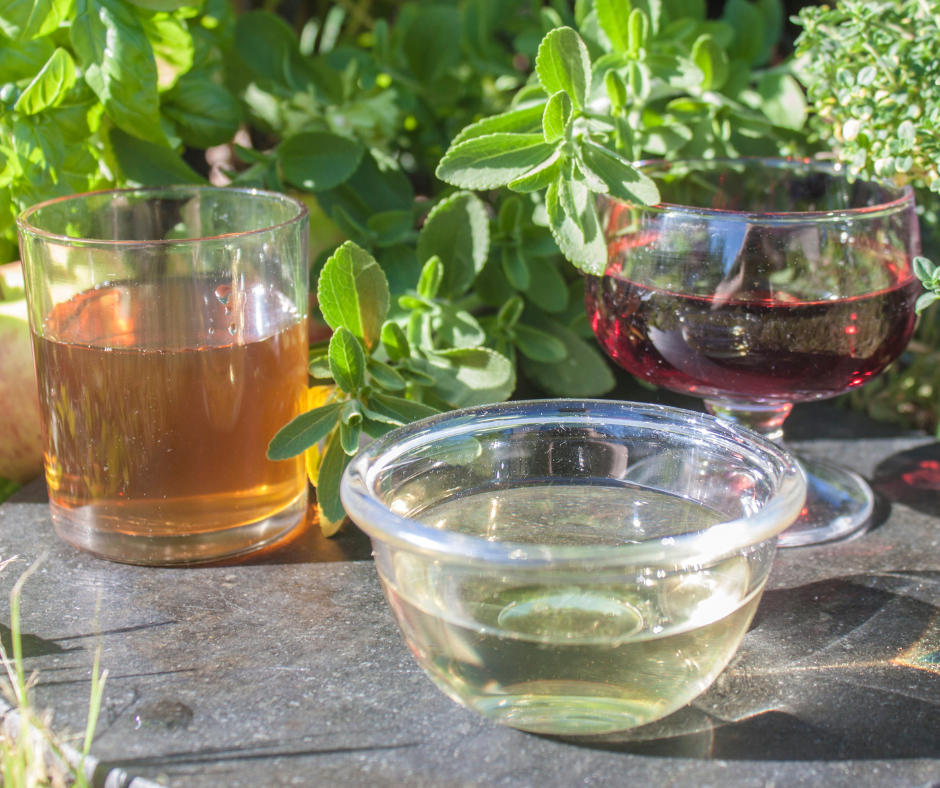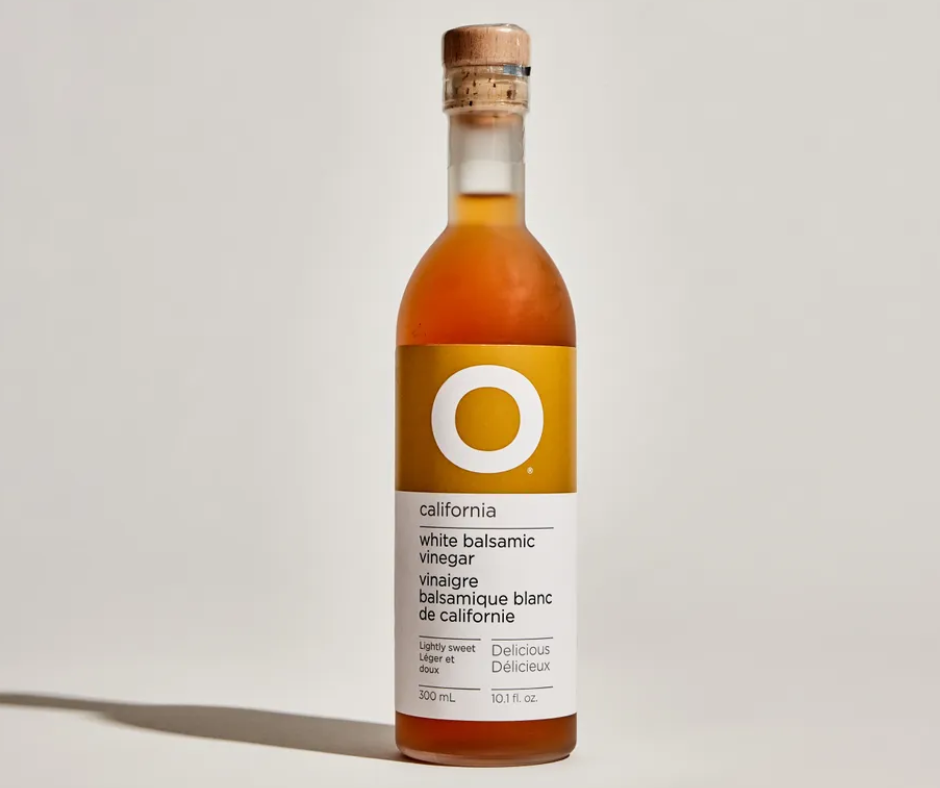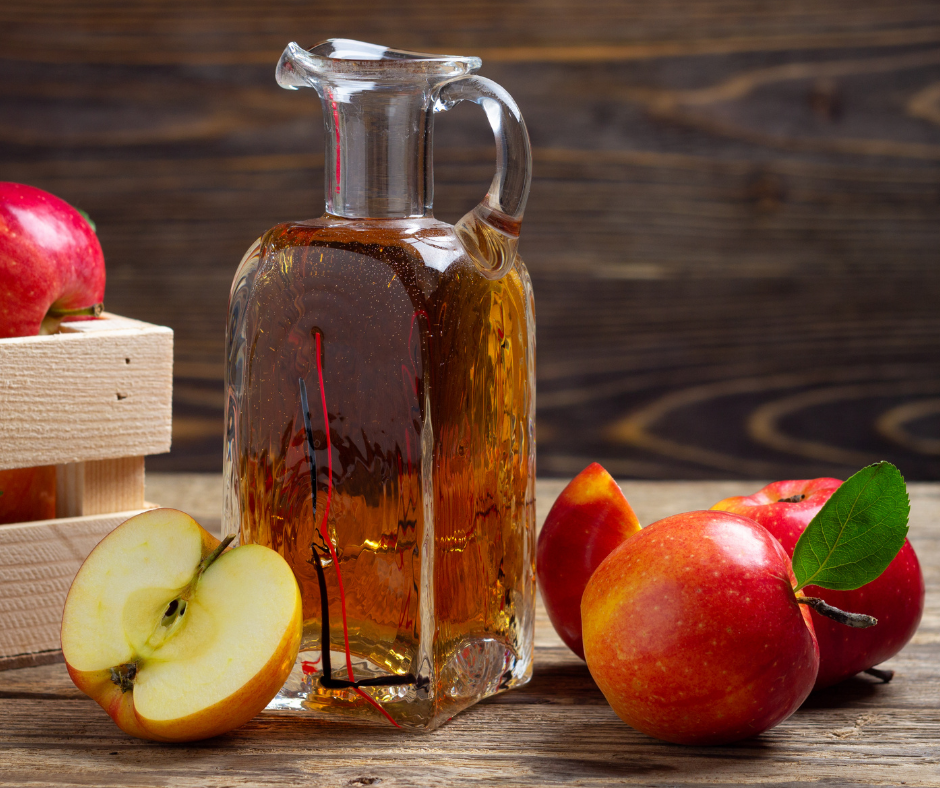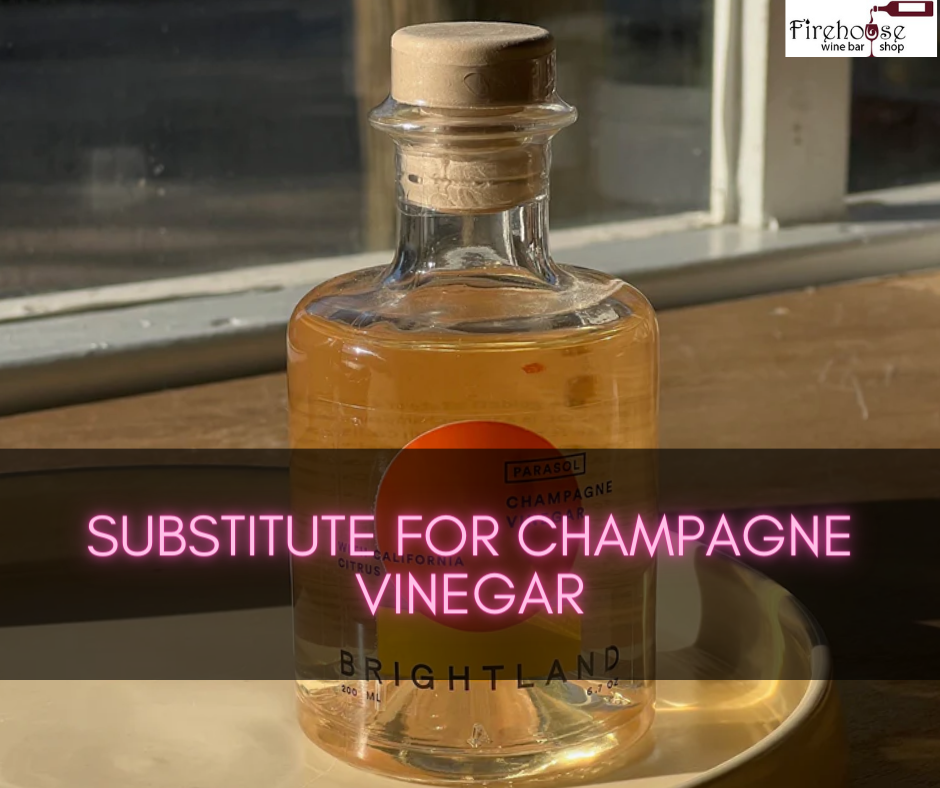Introduction
Finding the right ingredients can sometimes be a challenge in cooking. One such ingredient that may be difficult to find is champagne vinegar. However, fear not, as several substitutes can provide a similar flavor profile and acidity to your dishes. In this article, we will explore the importance of champagne vinegar in cooking and offer some options to Substitute for Champagne Vinegar that you can use confidently in your recipes.

The Importance Of Champagne Vinegar In Cooking
Champagne vinegar is often prized for its delicate and slightly fruity flavor. Made from the same method as champagne, it undergoes a fermentation process that creates a unique taste. Its mild acidity and subtle sweetness make it a versatile ingredient that complements a variety of dishes.
Champagne vinegar is commonly used in salad dressings, marinades, and sauces. Its gentle flavor enhances the taste of fresh ingredients without overpowering them. It adds a tangy brightness to vinaigrettes and balances out rich sauces, making it a popular choice among chefs and home cooks.
Difficulty In Finding Champagne Vinegar
While champagne vinegar is widely available in specialty and gourmet markets, it may not be easily found in regular grocery stores. Its limited availability can be attributed to the specific production process and high-quality champagne grapes.
If you cannot locate champagne vinegar or want to explore alternative options, several substitutes can provide a similar taste and acidity. Here are a few options to consider:
- White Wine Vinegar: White wine vinegar is made by fermenting white wine, which shares a flavor profile similar to champagne vinegar. It has a subtle fruity taste and mild acidity, making it an excellent substitute for salad dressings and marinades.
- Apple Cider Vinegar: Apple cider vinegar offers a slightly sweeter and more pronounced flavor than champagne vinegar. It works well in dressings and sauces that benefit from a hint of fruitiness.
- White Balsamic Vinegar: White balsamic vinegar is milder and less sweet than its dark counterpart. It has a delicate flavor that can add depth to your dishes without overpowering them, making it an ideal substitute for champagne vinegar.
- Citrus Juices: Freshly squeezed lemon or lime juice can provide the tanginess and acidity that champagne vinegar imparts. They work well in salad dressings and can add a refreshing burst of flavor to your recipes.
It’s important to note that while these substitutes can offer a similar flavor profile to champagne vinegar, they may not replicate its exact taste. However, they can still enhance your dishes and bring a unique element to your cooking.
In conclusion, while champagne vinegar may be difficult to find, several alternatives can provide a comparable flavor and acidity. White wine vinegar, apple cider vinegar, white balsamic vinegar, and citrus juices are all excellent substitutes. Experiment with these options to find the perfect replacement for your recipes and continue to enjoy delicious and flavorful dishes.
Why Not To Use Wine Or Champagne As A Substitute for Champagne Vinegar
Lack Of Acidity
While wine and champagne contain acidity, they may not provide the same level of tartness as champagne vinegar. Champagne vinegar typically has a higher acidity level, which adds a bright and tangy note to your dishes. In contrast, using wine or champagne as a Substitute for Champagne Vinegar may result in milder acidity, altering the flavor profile of your recipe.
Outcome Of Dishes Without Proper Acidity
The acidity in champagne vinegar plays a vital role in balancing flavors and enhancing the overall taste of a dish. Your recipe’s lack of proper acidity can lead to a dull and unbalanced flavor profile. For example, vinaigrettes made with champagne vinegar are renowned for their tangy and vibrant taste. Without enough acidity, the vinaigrette may taste flat and lackluster.
Although champagne vinegar has unique characteristics, suitable alternatives can be used in a pinch to achieve a similar flavor profile and acidity level. Here are a few options to consider:
- White Wine Vinegar: White wine vinegar is made from the fermentation of white wine and has a similar mild and tangy flavor profile. While it may lack the nuanced complexity of champagne vinegar, it can provide a comparable level of acidity in your recipes.
- Apple Cider Vinegar: Apple cider vinegar offers a slightly more pronounced fruity and tart flavor than champagne vinegar. It can add a pleasant tang to dressings, marinades, and sauces.
- Rice Vinegar: Rice vinegar, derived from fermented rice, has a delicate and mild flavor that is less acidic than champagne vinegar. However, it can still provide a subtle tanginess to your dishes without overpowering other flavors.
- White Balsamic Vinegar: White balsamic vinegar is similar to champagne vinegar in color and flavor. It has a slightly sweeter and milder taste, making it a suitable substitute when a delicate touch is desired.
While these substitutes can provide a similar level of tartness and acidity, it’s important to note that they may impart their distinct flavors to the recipe. Therefore, it’s recommended to adjust the quantities accordingly and taste as you go to achieve the desired result.
Next time you find yourself without champagne vinegar, reach for one of these alternatives to ensure your dish maintains its desired flavor profile and acidity level.

Substitute for Champagne Vinegar
Champagne vinegar, known for its delicate flavor and mild acidity, is a common ingredient in many recipes. However, it may not always be readily available in your pantry. Fortunately, several alternatives can be used as a substitute for champagne vinegar. These substitutes offer similar flavors and acidity levels, ensuring your dishes are still delicious.
Homemade Champagne Vinegar Substitute
You can easily make a homemade substitute if you cannot find champagne vinegar at your local store. Here’s a simple recipe and instructions:
- Ingredients:
- 1 cup white wine
- 2 tablespoons white vinegar
- Instructions:
- In a glass jar, combine the white wine and white vinegar.
- Cover the jar with a clean cloth or paper towel and secure it with a rubber band.
- Let the mixture sit at room temperature for 2 to 3 weeks, allowing it to ferment and turn into vinegar.
- Taste the vinegar regularly until it reaches the desired acidity level.
Taste Test Results
Compared to commercially produced champagne vinegar, homemade champagne vinegar substitutes may have slight variations in flavor and acidity. However, the homemade substitute generally offers a similar taste profile and can be used in various recipes.
White Wine Vinegar
White wine vinegar is an excellent substitute for champagne vinegar, as it shares similar flavors and acidity levels. It is made from fermenting white wine and has a light and tangy taste.
Similarity In Flavor And Acidity
White wine and champagne vinegar have a delicate and subtle flavor profile. They both bring a mild acidity to dishes without overpowering other flavors. This makes white wine vinegar a suitable and reliable substitute in most recipes for champagne vinegar.
Recommended Uses And Recipes
White wine vinegar can be used as a substitute for champagne vinegar in various recipes, including salad dressings, marinades, sauces, and vinaigrettes. It works well with seafood dishes, roasted vegetables, and light sauces.
Here are a few recipe ideas using white wine vinegar:
- Lemon Dijon Vinaigrette: In a small bowl, whisk together 2 tablespoons of white wine vinegar, 1 tablespoon of Dijon mustard, 1 tablespoon of lemon juice, ¼ cup of extra virgin olive oil, and salt and pepper to taste. Drizzle over salads or use as a marinade for grilled chicken or fish.
- Roasted Asparagus: Toss fresh asparagus with olive oil, 2 tablespoons of white wine vinegar, salt, and pepper. Roast in a preheated oven at 400°F for 15-20 minutes until tender and lightly browned.
- Creamy Herb Dressing: In a blender, combine ½ cup of Greek yogurt, 2 tablespoons of white wine vinegar, 1 tablespoon of fresh herbs (such as dill, parsley, or chives), 1 garlic clove, salt, and pepper. Blend until smooth and use as a salad dressing or a vegetable dip.
While champagne vinegar may be the preferred choice in some recipes, these substitutes offer a convenient and equally delicious option when you don’t have champagne vinegar on hand. Experiment with different substitutes and find your taste preferences and culinary creations best.

Rice Vinegar As A Substitute
When a recipe calls for champagne vinegar, but you are out of stock or prefer to try something different, don’t fret! Rice vinegar is an excellent substitute that can bring its unique flavors to your dishes. Let’s explore why rice vinegar is a great alternative.
Milder Acidity And Versatility
One of the reasons rice vinegar makes a suitable substitute for champagne vinegar is its milder acidity. While champagne vinegar has a tangy and tart flavor, rice vinegar offers a more delicate and less pronounced acidic profile. This milder acidity makes rice vinegar a versatile option that can lend a subtle tang to various recipes without overpowering other flavors. It is particularly well-suited for dressings, marinades, and sauces where a lighter acidity is desired.
Sweetness That Enhances Dishes
Another characteristic that sets rice vinegar apart is its inherent sweetness. Unlike champagne vinegar, which is known for its dryness, rice vinegar has a subtle sweetness that can enhance the overall flavor profile of a dish. The natural sweetness of rice vinegar adds complexity and depth to recipes, especially when used in Asian-inspired cuisine. It can balance spiciness and bring a refreshing sweetness to dressings, stir-fries, and sushi rice.
Rice vinegar is available in different varieties, including seasoned and unseasoned. Seasoned rice vinegar is commonly used in sushi rice, as it is already seasoned with salt and sugar. On the other hand, unseasoned rice vinegar offers more flexibility in terms of flavor customization, allowing you to adjust the sweetness and saltiness according to your preference.
It’s important to note that the substitution ratio may vary depending on the recipe and personal taste. As a general guideline, you can start using equal amounts of rice vinegar as a substitute for champagne vinegar. However, since rice vinegar is milder and sweeter, you might consider a slightly higher amount to achieve a similar flavor balance.
In summary, rice vinegar is an excellent alternative to champagne vinegar. Its milder acidity and subtle sweetness make it a versatile ingredient that can enhance a wide range of recipes. Next time you find yourself without champagne vinegar, try rice vinegar and discover a new dimension of flavor in your dishes.
FAQ: Substitute for Champagne Vinegar – Cooking Conundrum: Finding Alternatives to Champagne Vinegar
Q: What is champagne vinegar?
A: Champagne vinegar is a delicate, mild, and lightly flavored vinegar that is made from the same grapes used to produce champagne.
Q: Why would I need a substitute for champagne vinegar?
A: There may be times when you don’t have champagne vinegar on hand or you want to explore other options to create different flavors in your dishes.
Q: What are some suitable substitutes for champagne vinegar?
A: Here are some popular substitutes for champagne vinegar:
- White wine vinegar
- Rice vinegar
- Red wine vinegar
- Apple cider vinegar
- Sherry vinegar
- Lemon juice
Q: Which substitute should I choose?
A: The choice of a substitute depends on the specific recipe and the desired flavor profile. Experiment with different options to find the best fit for your dish.
Q: How do I use these substitutes in my recipes?
A: You can use the substitutes in the same quantity as you would use champagne vinegar. Start with a small amount and adjust to taste. Remember that each substitute may impart a slightly different flavor to your dish.
Q: Can I mix different types of vinegar as a substitute?
A: Yes, you can mix different types of vinegar to create a similar acidity level as champagne vinegar. For example, you can mix red wine vinegar with a milder, lighter-colored vinegar like rice vinegar or white wine vinegar.
Q: Are there any alternatives for champagne vinegar other than vinegar itself?
A: Lemon juice can also be used as a substitute for champagne vinegar in some recipes. While the flavor profile is different, the acidity level is similar, making it suitable for maintaining balance in your dish.
Q: Can I store the substitutes for a long time?
A: Keep in mind that each substitute has a different shelf life. Follow the storage instructions specific to each substitute to ensure its longevity.
Q: Are the substitutes equally versatile as champagne vinegar?
A: While the substitutes may not have the exact same flavor profile as champagne vinegar, they can still add a pleasant acidic tang to your dishes. Experiment with different substitutes to discover new flavors and combinations.
Q: Is it possible to create the same taste as champagne vinegar using substitutes?
A: Each substitute will add its own unique flavor to your dishes, so it is not possible to replicate the exact taste of champagne vinegar. However, the substitutes can still enhance the overall flavor profile of your recipe.
Q: Can I use the substitutes in salad dressings and marinades?
A: Absolutely! The substitutes can be used in salad dressings, marinades, sauces, and other recipes that call for champagne vinegar. Just ensure that you choose the substitute that complements the other ingredients in your dish.
Conclusion
In conclusion, finding a suitable substitute for Champagne Vinegar is not as difficult as it may seem. By understanding the flavor profile of champagne vinegar and considering the options available, you can easily find a substitute that works best for your recipe and taste preferences. Whether you opt for white wine vinegar, apple cider vinegar, white balsamic vinegar, or a combination of ingredients, experimenting in the kitchen can lead to delicious results. Remember to adjust the quantities and flavors accordingly to achieve the desired outcome. Enjoy your culinary journey and have fun exploring the world of vinegar substitutes!
Comparison Of Various Substitutes
When seeking a substitute for champagne vinegar, it is essential to consider the flavor profile and acidity level. Here are a few popular alternatives to champagne vinegar:
- White wine vinegar: Like champagne vinegar, white wine vinegar offers a mild acidity and delicate flavor. It works well in dressings, marinades, and sauces.
- Apple cider vinegar: With its fruity and slightly sweet taste, apple cider vinegar can be a good substitute for champagne vinegar in recipes that can tolerate a hint of apple flavor.
- White balsamic vinegar: Although it has a slightly different flavor profile, it can provide a similar mild and tangy taste to champagne vinegar. It is an excellent option for lighter-colored sauces and dressings.
- Combination of vinegar and citrus juice: If you don’t have any vinegar on hand, you can mix lemon or lime juice with water to achieve a similar level of acidity. This combination works well in recipes that require a subtle citrus flavor.
Tips For Selecting The Best Substitute
When selecting a substitute for champagne vinegar, consider the following tips:
- Assess the flavor profile: Choose a substitute that complements the flavors in your dish. Consider whether a milder or more pronounced acidity would work best.
- Adjust quantities: Remember that each substitute may have a slightly different acidity level. Start with a smaller quantity and taste as you go, gradually increasing or decreasing as needed.
- Experiment with combinations: If you’re unsure which substitute to use, consider combining different vinegar substitutes to create a unique flavor profile that closely matches champagne vinegar.
Final Thoughts On Cooking Without Champagne Vinegar
While champagne vinegar adds a distinct touch to recipes, don’t let its absence deter you from trying new dishes. You can still achieve delicious results with a little creativity and the right substitute. Embrace the opportunity to experiment and discover new flavor profiles. Remember, the joy of cooking is all about adapting and making the most of the ingredients you have on hand. So, don’t be afraid to think outside the bottle and explore the endless possibilities of cooking without champagne vinegar.

Andre Lotz immigrated to the United States from South Africa almost 20 years ago. Still, he didn’t feel truly at home until he settled in Mobile—a city that reminds him of his childhood home of Fish Hoek on the southern cape of Africa.

